CFA Costume Designers Help Swedish Company Stitch Together a New Rigoletto

Stefano Meo as Rigoletto and members of the chorus in Opera på Skäret’s Rigoletto, wearing costumes designed by Susan Mickey, School of Theatre director.
CFA Costume Designers Help Swedish Company Stitch Together a New Rigoletto
Susan Mickey and four BU students spent July in the countryside working with Opera på Skäret
In rural Sweden, 140 miles northwest of Stockholm, Opera på Skäret stages its productions in a former timber warehouse on the wooded shores of Lake Ljusnaren.
“It’s really pretty magical,” says Susan Mickey, director of the BU College of Fine Arts School of Theatre.
“It’s a huge, huge edifice, right by the lake,” she says. “It seats about 800, and it’s very big, very high, like a barn, and they left the inside completely raw. Sometimes there are birds in the rafters singing along.”
Mickey, a costume designer by profession, working in theater and film, and four School of Theatre students spent the month of July there working on the company’s production of Giuseppe Verdi’s Rigoletto, which runs July 29 through August 27.
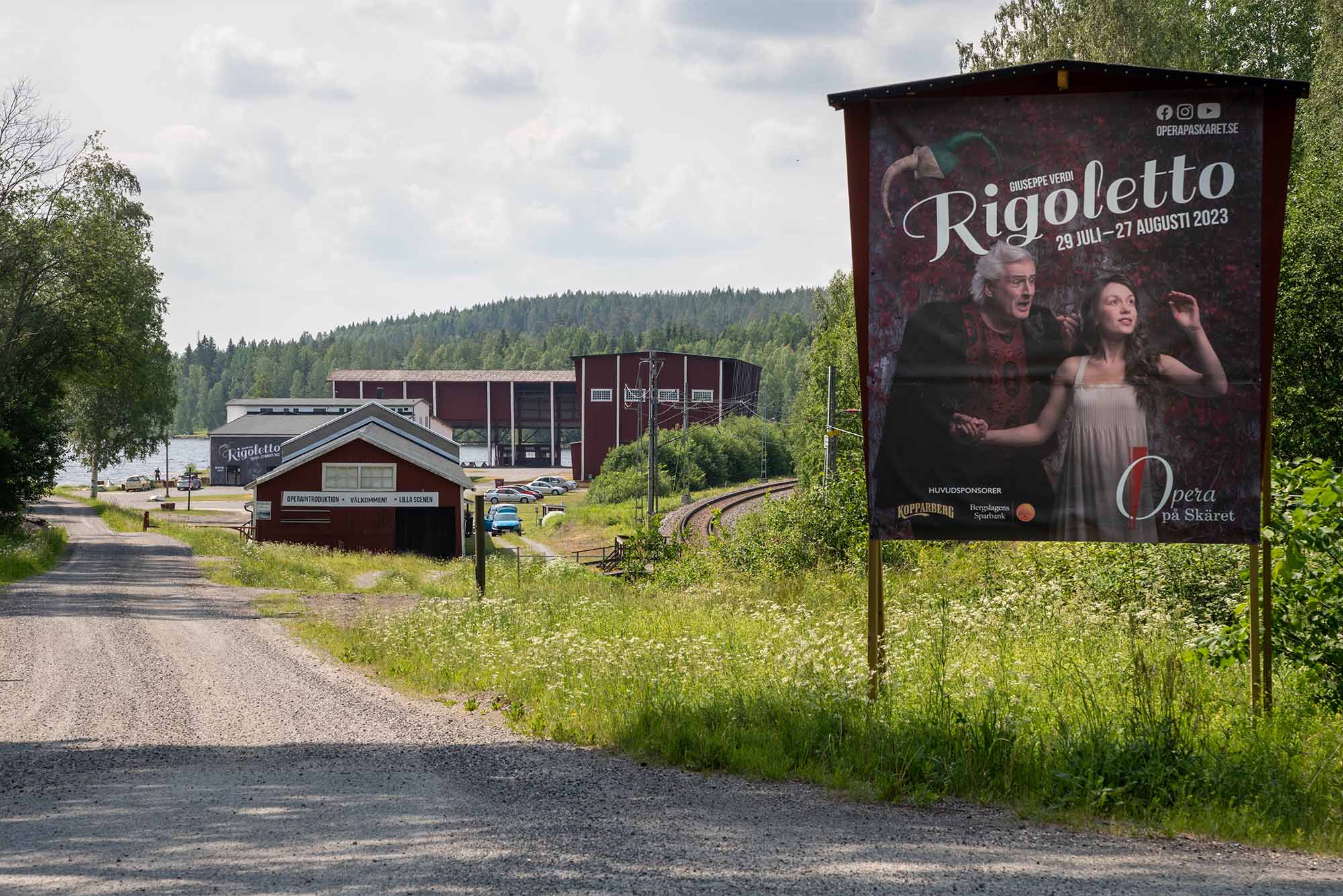
“The singers go swimming in the lake every day between rehearsals, and someone told me they even do it during intermission, which is 45 minutes,” Mickey says. “It’s very, very beautiful.”
Her connection with Opera på Skäret is director Leslie Swackhamer, who Mickey had worked with before, including on a production of Madame Butterfly for the company six years ago. “The dates meant Rigoletto would fit into a college schedule, and she called me in November and said, ‘I’m doing another opera there—do you want to do it?’” Mickey says.
It was an easy yes. “It’s like opera summer stock, but the quality of the singers and musicians is way above that,” she says. “They are incredibly high-quality artists, and it is absolutely humbling to walk around and hear singers training, training, training, hearing them in the dressing room and the halls. It’s like being around professional athletes, it’s just incredibly inspirational.”
Working with Mickey were Gregg Wiggans (CFA’25), Yao Kuang Lee (CFA’25), Duncan Michael (CFA’25), and Dante Gonzalez (CFA’24). Wiggans is an MFA directing student who assisted Swackhamer, while the other three worked with Mickey and a handful of Opera på Skäret staffers to produce approximately 70 costumes for the production, which is double-cast.
Kidnapping plots, curses, mistaken identities
Rigoletto is the story of a hunchbacked jester who seeks revenge when his daughter, Gilda, is seduced by the dissolute Duke of Mantua. This being opera, of course, it’s not that simple. The three acts involve kidnapping plots and curses and mistaken identities. Latvian baritone Valdis Jansons and Italian baritone Stefano Meo alternate as Rigoletto.
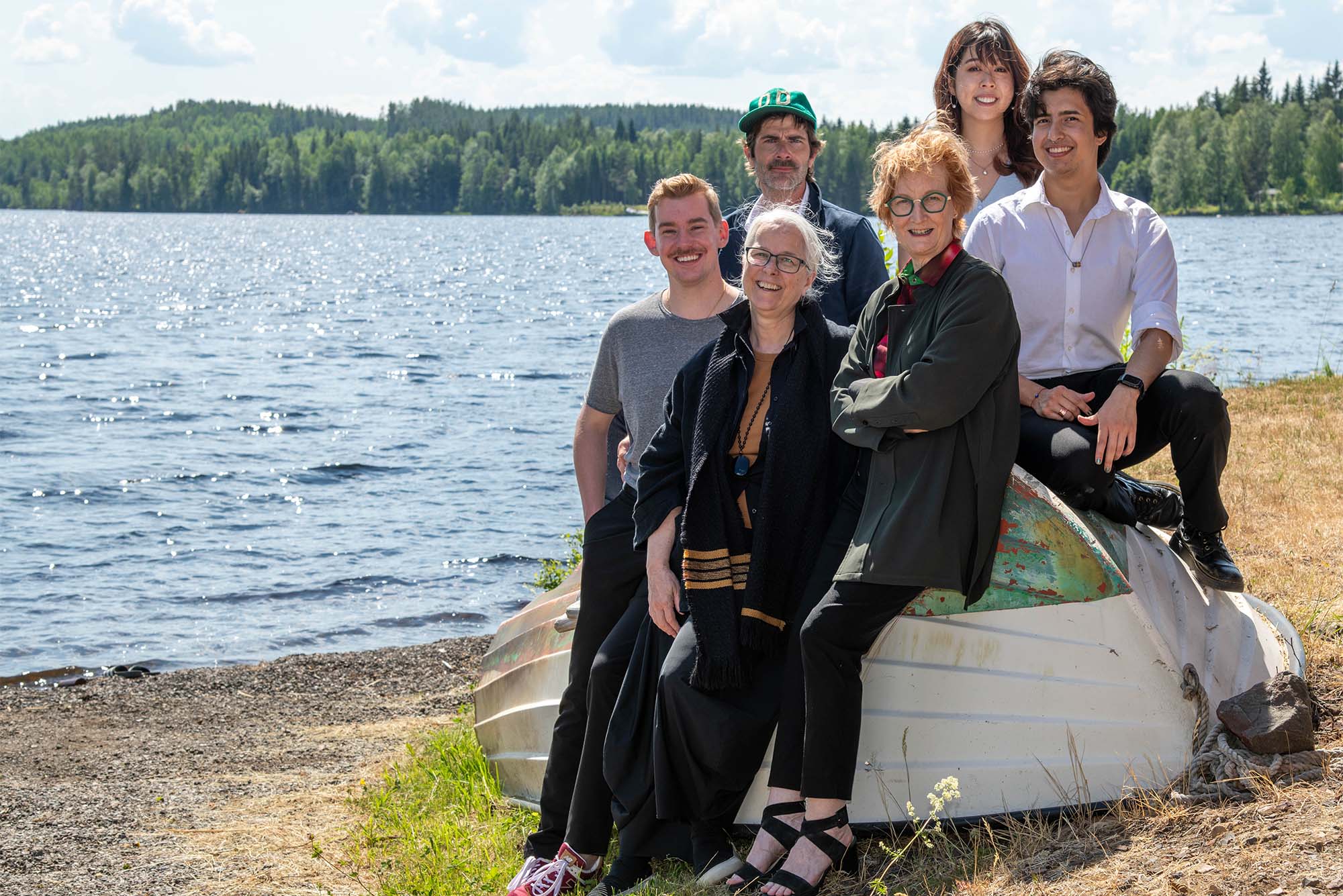
Opera på Skäret director and founder Sten Niclasson directed the company’s previous Rigoletto in 2006, and he says if anything, the opera is more timely now in the era of Donald Trump, Jeffrey Epstein, and #metoo. “It’s very accurate in some ways,” he says, about men who treat women as playthings.
“Leslie just really wanted to bring the story of Rigoletto to an audience in a way they could really understand and feel it—she wanted really good, clean storytelling,” Mickey says. The costumes are “modern dress, but with an anachronistic flair. At the very beginning at this ball, the men are wearing tuxes and coats, but with brooches and jewel tones and ascots and chapeaus. It almost looks like a Prince concert. It’s modern dress, but let’s say, ostentatiously baroque.”
Lee, an MFA student in costume design, made 24 Venetian-style gold masks for a ballroom scene and 18 animal masks for the kidnapping scene, including a ram, a lion, and a jackal.
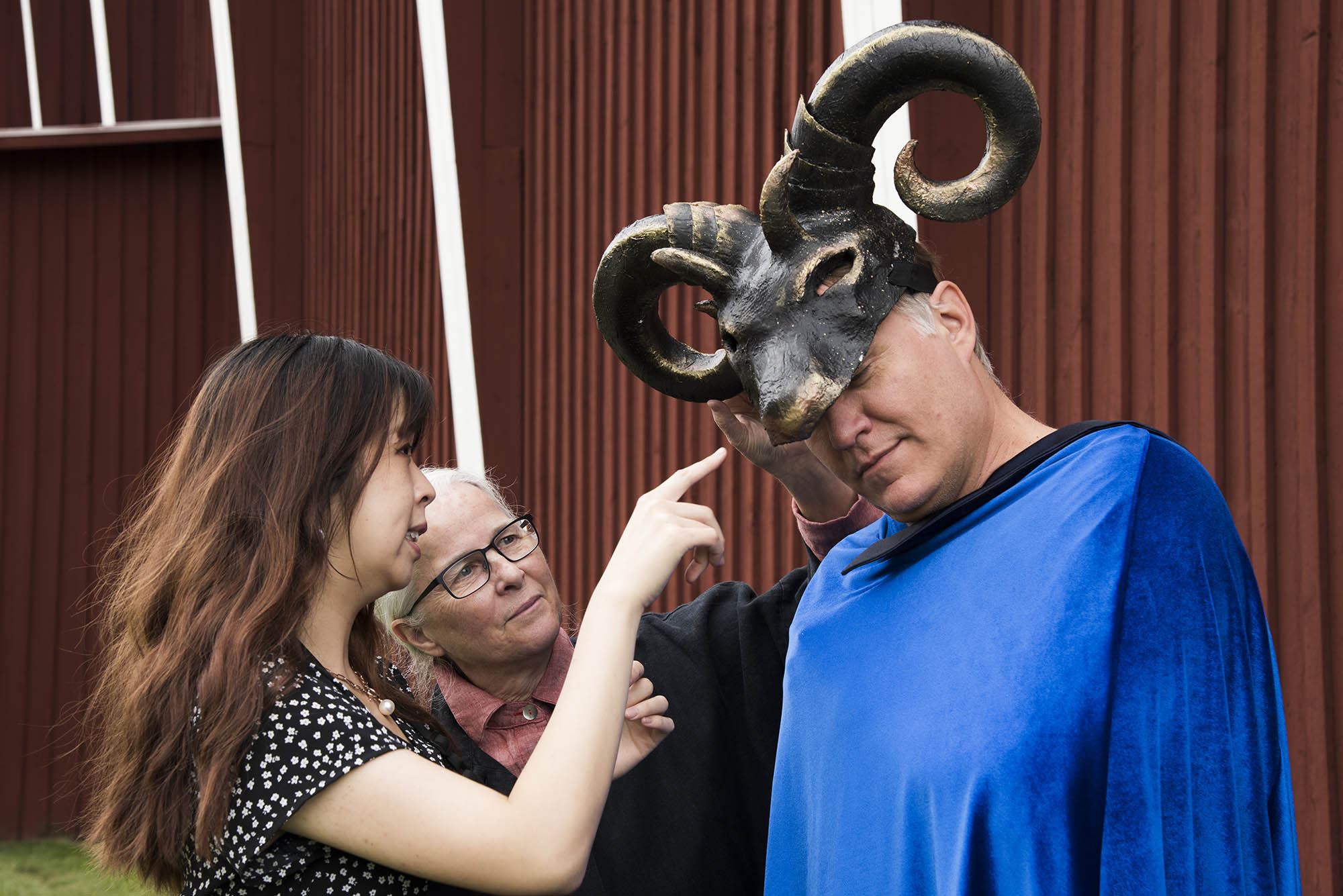
“I was very excited to see the cast wearing the masks,” Lee says. “The process was quite challenging because I was the only person working on masks. The foam material that we got was a kind that I’m not so familiar with, so it took longer for me to complete my task. Yes, I was mostly off in the corner by myself. But I did get some help from our wonderful BU team and the makeup team.”
“I’ve been sewing lots of alterations,” says theater arts student Gonzalez, “making sure the clothes fit properly and comfortably, painting shoes and masks with Kuang, and helping Susan shop.”
Michael, an MFA candidate in costume production who was the costume shop supervisor and Mickey’s assistant for the month, made five dresses for the production. “I’ve never been to Sweden before, so that was the main draw for me,” Michael says. “Plus, opera is always exciting to work on, the drama, the prestige, it’s very glamorous. Now I’m getting to make beautiful costumes in a beautiful country.”
The BU team worked with Opera på Skäret staff from Turkey, Ukraine, and Switzerland as well as Sweden.
“This is an experience that links them not only with professionals in their field, but also with international artists, because people come from all over the world and work incredibly closely here,” Mickey says. “We eat together all the time and talk about how they work in their countries.”
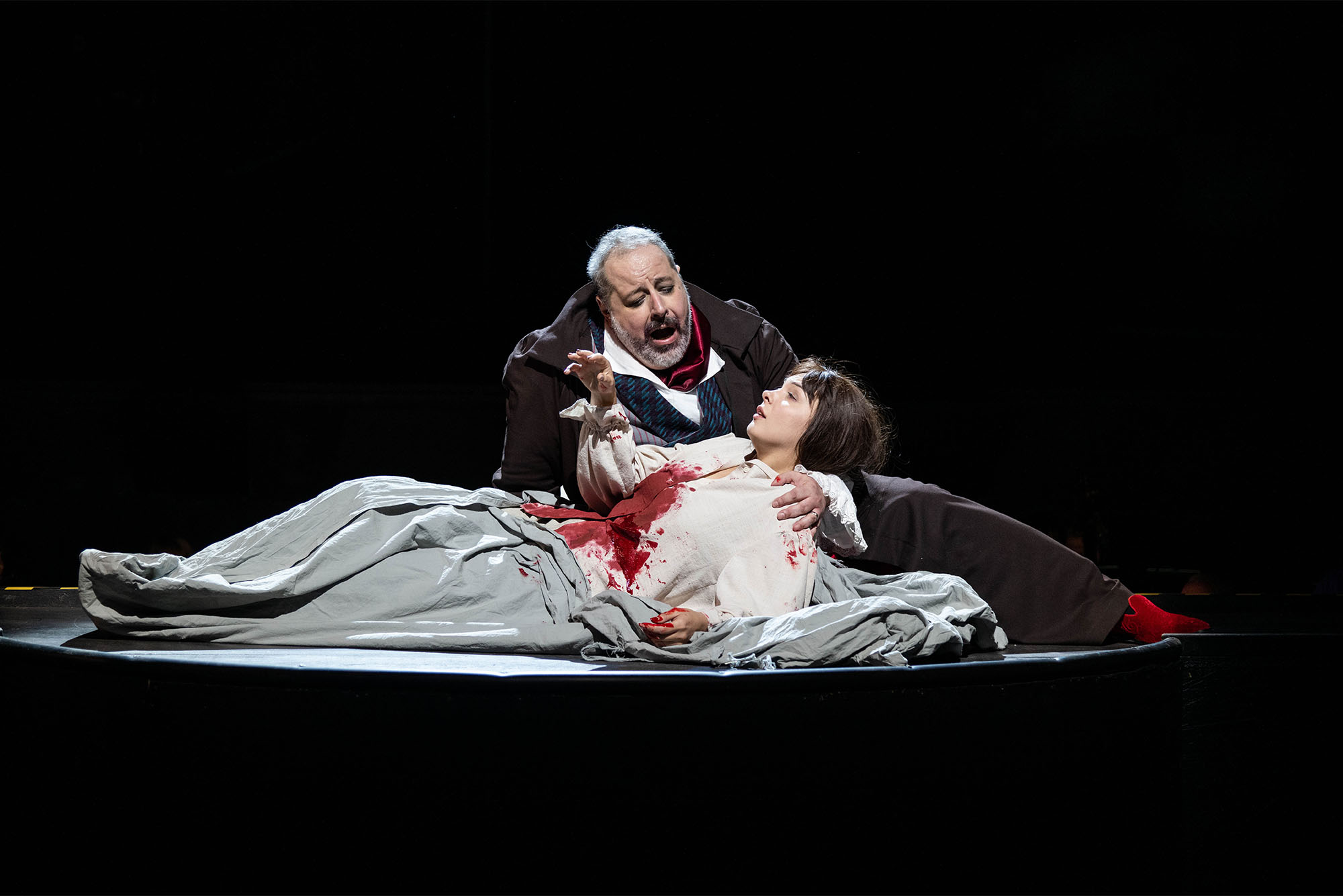
The students aren’t getting class credit for the project, but may count it as an internship, she says. They got airfare from BU and housing and a stipend from the company. “It’s a programmatic requirement, they are heartily encouraged to work during the summer, and we help find them things,” Mickey says.
“We did Madame Butterfly with Susan, and we are very happy to have her back,” Niclasson says. “And she also [brought students] with her, which has been very nice. They are very competent and bring a lot of energy. We give them a lot of trust.”
A happenstance beginning
Niclasson, himself an opera singer, was on tour around Sweden back in 1996 and singing in a church nearby when he stumbled on the sawmill complex.
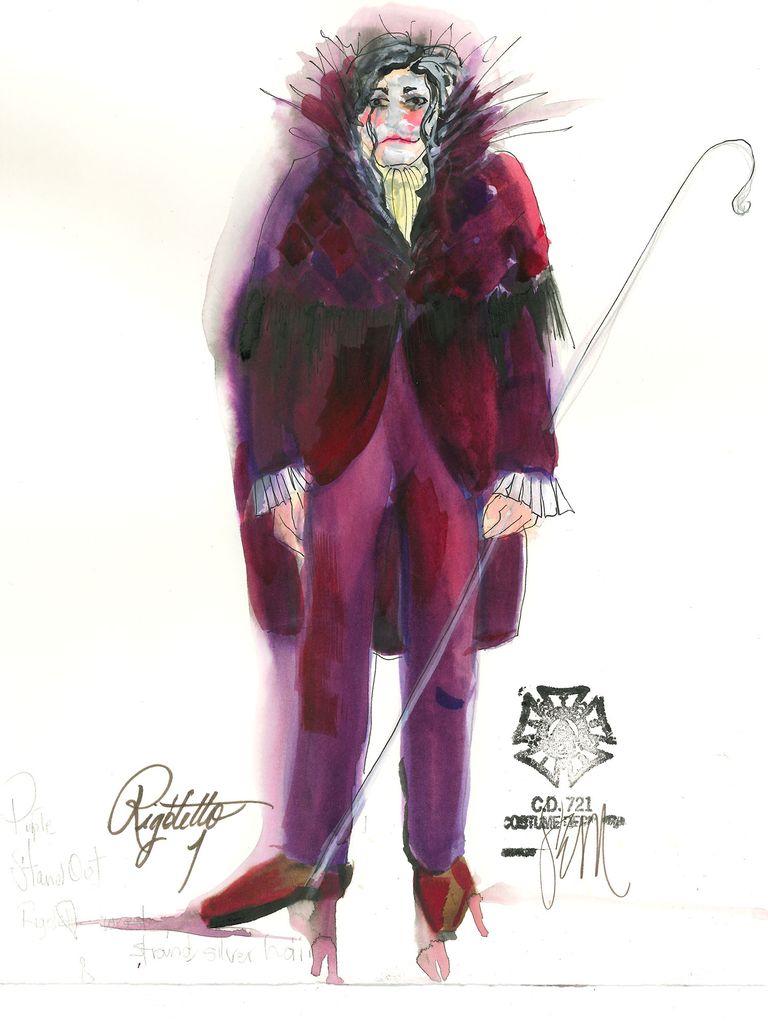
“I took my car just to drive around to look at the landscape and what was around,” he says. “And suddenly, this place was in front of me. Really cool. And it was empty, and nobody used it. And the big [warehouse] was there and the fantastic acoustics were there. So I got this idea in my head that we have to play opera there.”
It took several years to buy the site from the government. This is Opera på Skäret’s 20th anniversary season, and the company is named for its location, Skäret, a tiny hamlet outside the town of Kopparberg.
Niclasson’s wife and son, Alexander, are also opera singers, and his daughter is a singer-songwriter in London. For most of the company’s existence, Niclasson was also artistic director, but his son succeeded him a couple of years ago.
“We have two or three very important things that we want with our productions,” Niclasson says. “Number one is that we have respect for the composer and the librettist. They have done something which is already an artwork. That doesn’t mean that you couldn’t do your interpretation, of course, but you have to have respect for both the music and text.
“Another is that to us, opera is really something that is mostly singing. And we really want to give the audience first-class singing, so that’s why we have auditions every year. And they’re coming from the world to audition for our operas.
“The third thing I think is special here is that we really want opera for the people,” he says.
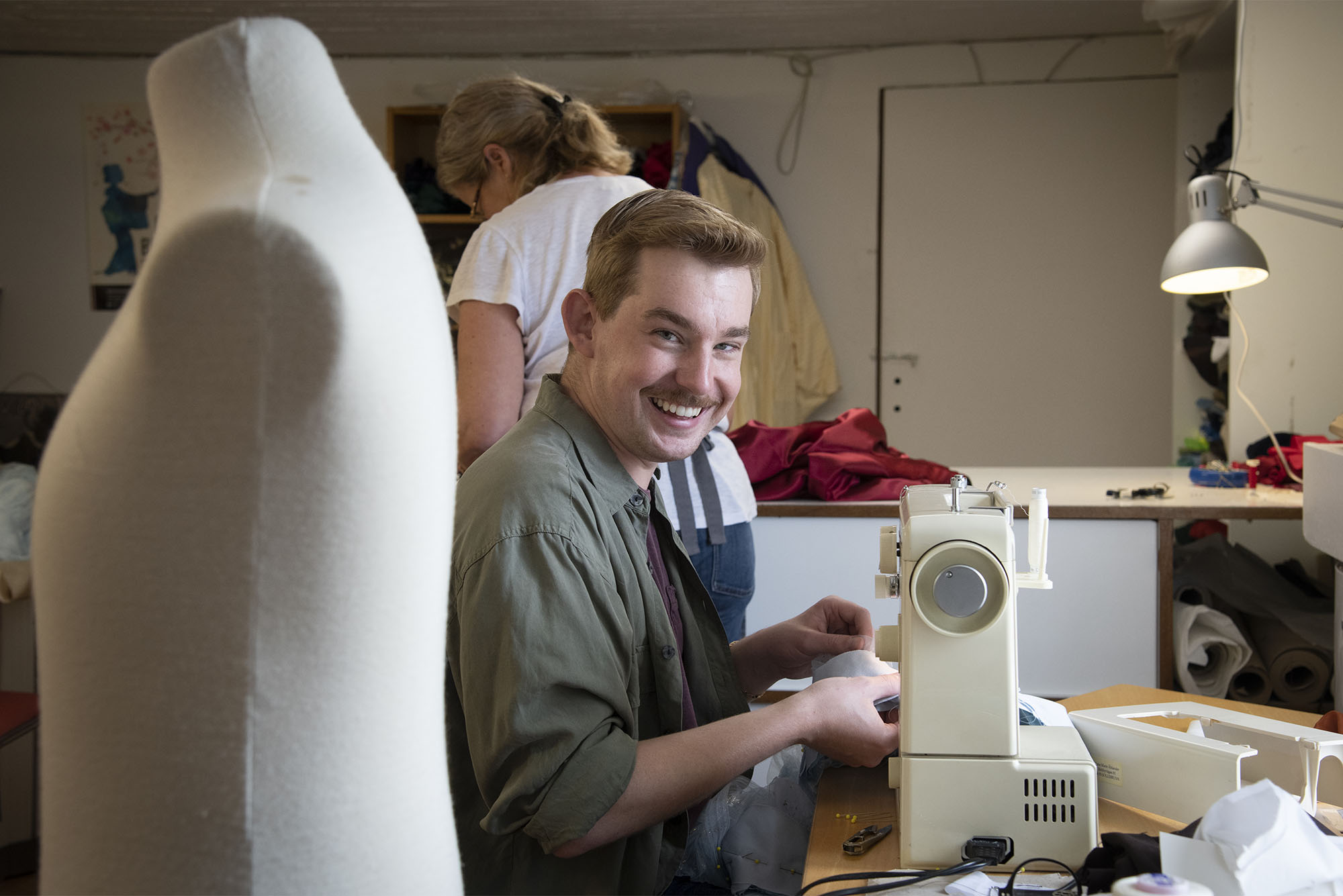
The company has largely recovered its audience after the pandemic, Niclasson says. “Compared to what we had and what it seems to be like this year, we have got the audience back.”
“In the summer they have a vintage train that comes from Stockholm and ends right at the opera house,” Mickey says. “You get on in Stockholm and have lunch on the train and the opera starts at 4 pm, and then you get back on the train and have dinner on your way home. And you’re home that night.”
The BU crew stayed in apartments a few minutes away from the opera campus, near Kopparberg. “It’s a blink-and-you’ll-miss-it sort of place,” Mickey says. “There’s a pizza joint and a shoe store and a post office, and that’s it.”
And being where it is, the daylight situation is a little different than on Comm Ave.
“The sun does not go down, although it gets kind of twilight from midnight to about 3,” Mickey says, noting that blackout curtains and sleep masks are necessary for most, at least in the beginning. “It’s so weird. You’re sitting outside talking, and you think it must be 8:30 or 9 pm, and it’s 2 in the morning.”

Comments & Discussion
Boston University moderates comments to facilitate an informed, substantive, civil conversation. Abusive, profane, self-promotional, misleading, incoherent or off-topic comments will be rejected. Moderators are staffed during regular business hours (EST) and can only accept comments written in English. Statistics or facts must include a citation or a link to the citation.